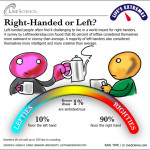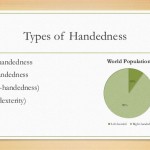Time was when it was all so simple: you were left or right handed, albeit society frowned upon those with dominance to the left, being non-compliant with the norm and therefore radically dangerous. Go back far enough and you learn the connections: “sinister” and “cack-handed” have been applied to lefties for very many generations. The reasons why people are one way or the other make for fascinating reading by themselves (see here), but the social impact is a different story. From Wikipedia:
Many tools and procedures are designed to facilitate use by right-handed people, often without even realizing difficulties placed on the left-handed. John W. Santrock has written, “For centuries, left-handers have suffered unfair discrimination in a world designed for right-handers.” Moreover, apart from inconvenience, left-handed people have been considered unlucky or even malicious for their difference by the right-handed majority.
In many European languages, including English, the word for the direction “right” also means “correct” or “proper”. Throughout history, being left-handed was considered negative. The Latin adjective sinister means “left” as well as “unlucky”, and this double meaning survives in European derivatives of Latin, including the English word “sinister” (only when referring to the bearer’s left of a coat of arms).
There are many negative connotations associated with the phrase “left-handed”: clumsy, awkward, unlucky, insincere, sinister, malicious, and so on. A “left-handed compliment” is considered one that is unflattering or dismissive in meaning. In French, gauchemeans both “left” and “awkward” or “clumsy”, while droit(e) (cognate to English direct and related to “adroit”) means both “right” and “straight”, as well as “law” and the legal sense of “right”. The name “Dexter” derives from the Latin for “right”, as does the word “dexterity” meaning manual skill. As these are all very old words, they would tend to support theories indicating that the predominance of right-handedness is an extremely old phenomenon. Black magic is sometimes referred to as the “left-hand path“.
Until very recently in Taiwan (and still in Mainland China), left-handed people were strongly encouraged to switch to being right-handed, or at least switch to writing with the right hand. Due to the importance of stroke order, developed for the comfortable use of right-handed people, it is considered more difficult to write legible Chinese characters with the left hand than it is to write Latin letters, though difficulty is subjective and depends on the writer. Because writing when moving one’s hand away from its side towards the other side of the body can cause smudging if the outward side of the hand is allowed to drag across the writing, writing in the Latin alphabet might possibly be less feasible with the left hand than the right under certain circumstances. Conversely, right-to-left alphabets, such as the Arabic and Hebrew, are generally considered easier to write with the left hand in general. Depending on the position and inclination of the writing paper, and the writing method, the left-handed writer can write as neatly and efficiently or as messily and slowly as right-handed writers. Usually the left-handed child needs to be taught how to write correctly with the left hand, since discovering a comfortable left-handed writing method on one’s own may not be straightforward
If you wanted to know the impact on lefties of being forced to write with their right hands, read this fascinating article.
This rings a lot of bells for me. My left-handed grandmother was forced at an early age to write right-handed and I know this was true of many other people of her generation – as was I, thanks to my dad. He took the view that my use of my left hand looked different and awkward and was therefore probably I should use my right for preference – though this was not quite the effect. With the benefit of hindsight his intervention induced a lot of confusion in the short term but over time allowed me to apply degrees of versatility – though it’s not just me questioning what is “normal.” Nowadays we all need to find more effective ways to use our hands in the face of greater multi-tasking requirements, and the fact that the world is not created for the left-handed.
Quite apart from the awkwardness of writing left-to-right, for which many took to the “hook” position to avoid smudging and to see what they were writing, it was always tricky for lefties in a right-handed world. While there are indeed shops that sell left-handed gadgetry most products marketed are geared to right-handed use – even knife blades. No small wonder that the 10-15% of the population impacted in this way either struggle on and fail, or adapt to circumstances.
But it’s no longer that simple. People are, in the words of someone I heard interviewed on the radio, “mixed-handed” these days, as opposed to “ambidextrous” – where you retain the ability to do anything equally well with either hand. Maybe this “cross-dominance” is in some small part a reflection of how society has changed, such that we are now continuously multi-tasking, texting with one hand while stirring the soup or vacuuming the carpet with the other, but there seems little doubt to me that we apply use of our limbs in far more creative ways than did previous generations.
We have learned to maximise our productivity by using all means available to us. For myself, I find it confusing. Sometimes I do things one way or the other without thinking, often both, while on other occasions I have to think and try it out both ways to work out which is the more comfortable. One thing for certain: my handwriting is crap either way, so I’d much sooner touch-type, thus demonstrating an innate ability influenced by the training I once did to use both hands simultaneously for greatest effect. 2I took to doing most things right-handed as well as left, if only for expediency, but that has many long-term benefits.
This reflects in strange ways. Taking cricket as one example, it’s quite common to see a player bowl one way and bat another. My natural inclination is to bowl left-handed, bat right-handed, and throw with the left, but I struggle to explain why – other than habit. I always text left-handed, though many around me use their phones with two index-fingers. I tend to use a computer mouse right-handed, but then so do many left-handed people. I iron ambidextrously, depending on which hand is most accessible.
Take guitarists (see here): Most are right-handed. Some naturally left-handed guitarists play right-handed (eg. Chris Rea.) Some play left-handed, either, like Jimi Hendrix, by playing a right-handed guitar upside-down, or (like Paul McCartney) stringing it correctly to play left-hand (“McCartney first tried playing right-handed, but was making no progress. He saw a picture of Slim Whitman playing left-handed and realized that it was necessary to reverse the guitar, pick with the left hand, and reverse the strings.”) Whitman was right-handed but forced by an accident to begin playing left-handed.
In short, life for the left-handed is packed with challenges, each of which is approached in a unique and individual way, each of which is a mark of the innovative capacity of the individual. But it goes further than that, down to research suggesting that left-handed people think differently, are more likely to be creative and highly intelligent, are more susceptible to diseases, and are statistically prone to shorter life-span.
There are curious social constructs too: of the most recent US presidents, the majority have been left-handed (see here and here), which may be coincidental but arguably not. David Cameron is left-handed (see here), as were his predecessors James Callaghan and Winston Churchill, for example. “Lefties are leaders, not losers” says The Guardian.
There is unquestionably a leaning towards left-handedness and ambidexterity in the arts, most famously with Leonardo da Vinci, who was renowned for his ability to write and paint simultaneously with both hands. Then the high-proportion of sportsmen and women who find advantage in their dominant hand, not least boxing “southpaws“. What is the truth?
Well but the urban mythology is not necessarily based on fact. Take this account by Christian Jarrett PhD:
It is a curious quirk of human nature that most of us prefer using our right-hand, while a minority of around 10 % prefer using their left – a ratio that has remained relatively stable throughout human history. Experts remain unsure how handedness emerges in a developing child, and they struggle to explain the persistence of the ratio of right to left-handers. Against this backdrop, a number of cultural myths have grown up around the differences between left and right-handers. Here I give you a low down on myths and facts about handedness. Before we start, let me debunk an immediate misnomer. There really is no such thing as strict left- or right-handedness. Most people can do something with their weaker hand. A more important distinction might be the strength of preference we have for one hand, be it left or right (researchers use the term “mixed-handedness” for a lack of preference). With that clarified, here are my three myths and facts about left-handers and handedness:
1. Myth: Left-handers are more introverted, intelligent and creative.
There are anecdotal accounts of artists and musicians tending to be left-handed, an observation given wings by the overly simplistic notion that the right-hemisphere (which controls the left hand) is the seat of creativity. Advocates point to Leonardo de Vinci, a leftie, Paul McCartney, another leftie, and many more. But as psychologist Chris McManus explains in his award-winning book Right Hand Left Hand, “although there are recurrent claims of increased creativity in left-handers, there is very little to support the idea in the scientific literature.” Regarding lefties having an introverted personality, a paper published just this year (link is external) surveyed 662 New Zealand undergrads about their handedness and personality. “Left- and right-handers did not differ on any personality factor,” the researchers reported. However, there was a tendency for people with a weaker preference for either hand (i.e. the mixed-handed) to be more introverted.What about IQ? One massive study(link is external) found no link with handedness; another (pdf link is external)) found a slight IQ advantage for right-handers (put both studies together and any intelligence/handedness link is negligible).
2. Fact: Left-handers are less likely to be left-hemisphere dominant for language.
In the vast majority of the population, language function is nearly always localised to the left hemisphere. This is why a stroke or other brain injury suffered to the left side of the brain tends to lead to language problems. Among right-handers, left-sided dominance for language approaches upwards of 95 per cent prevalence. However, among left-handed people this drops to 70 per cent, with the others either having language localised to the right hemisphere, or spread evenly across both hemispheres.
3. Myth: Left-handed people die earlier and suffer more immune diseases
The early death myth originates with a 1988 Nature paper by Diane Halpern and Stanley Coren: “Do right-handers live longer (link is external)?” The psychologists analysed death records for baseball players and found that those who were left-handed had died younger. But as Chris McManus explains, this is a statistical artefact borne by the fact that left-handedness increased through the 20th century, meaning that left-handers, on average, were born later in that century. As an analogy, McManus points to Harry Potter fans, who tend to be younger than non-fans. “Ask the relatives of a group of recently deceased people whether their loved one had read Harry Potter and inevitably one will find a younger age at death in Harry Potter enthusiasts,” he writes, “but that is only because HP readers are younger overall.” If this statistical argument makes your head spin, let me offer you a 1994 study of cricketers, which concluded: “Left handedness is not, in general, associated with an increase in mortality(link is external).” A related myth, propagated by Geschwind, is that left-handers are more vulnerable to immune disorders. McManus and Phil Bryden analysed data from 89 studies involving over 21,000 patients and an even greater number of controls: “Left-handers showed no systematic tendency to suffer from disorders of the immune system,” McManus writes.
4. Fact: We get more mixed-handed as we get older
For a 2007 study (link is external) Tobias Kalisch and his colleagues recruited 60 participants who were all strongly right-handed and tested them on a range of fiddly manual tasks, including: line tracing, aiming, and tapping. Whereas the younger participants (average age 25 years) performed far better with their right hand on all tests, the middle-aged (average age 50) right-handers performed just as well with either hand on the aiming task. And two older groups (average age 70 & 80 years) performed just as well with either hand on all tasks bar one. Unfortunately, the main reason for the older participants’ greater ambidexterity was the fact they’d lost their superior performance with their right-hand.
5. Myth: Left-handers are persecuted
Reviewing a recent book on left-handers (Rik Smits’ The Puzzle of Left Handedness), a Guardian critic observed (link is external): “Sadly, prejudice against left-handedness is deep-rooted and universal.” Is it? There’s no doubt that left-handers have had a rough time in the past. Many were forced to use their right hand, and across many cultures there’s a deep bias towards right being good and left bad. Consider expressions like “right-hand man”, “two left feet” and the fact that Muslims use their right hand for eating and their left hand for ablutions. However, in Western cultures at least, the persecution of lefties appears to be over. Look at the fact that 5 out of the last 7 US presidents have been left-handed. If life is so tough for lefties, you’d hardly expect them to reach the most powerful position in the world so frequently. Okay, that’s largely conjecture, but what about the 2013 study (link is external) I mentioned earlier, which also involved over a 100 New Zealand students rating the personality of a typical left or right hander. Their belief was that left-handers tend to be more introverted and open to experience. As the authors wrote, this “artistic” stereotype“can hardly be considered negative.” They added: “We found no evidence that left-handers are a stigmatised minority in our young Western population.”
6. Fact: Lefties have an advantage in many sports:
Left-handers are disadvantaged in some sports because of the safety rules – for example, in polo, the mallet must be held on the right-hand side of the horse. However, in sports where opponents compete against each other directly, face to face, such as boxing or tennis, the left-hander has a distinct advantage. Stated simply, they are more used to facing right-handed opponents (which the majority of their rivals will be) than right-handers are used to facing left-handers. Indeed, one evolutionary account for why left-handedness has survived is that it confers a fighting advantage – the so-called “fighting hypothesis (link is external)“. There are many studies in the literature that explore the left-hander’s advantage in sports like boxing (link is external) and fencing (link is external).
–I hope you enjoyed this round-up. If you’re interested to learn more, I highly recommend Chris McManus’s book Right Hand, Left Hand, The Origins of Asymmetry in Brains, Bodies, Atoms and Cultures (link is external) and also check out the new paper I cited by Grimshaw and Wilson: A sinister plot? Facts, beliefs, and stereotypes about the left-handed personality(link is external).
Oh, in case you were wondering, one last thing: left-handers tend to perform better with their right hand than right handers with their left (link is external).
Perhaps the last point is the one I had definitely spotted from observation and experience – by virtue of necessity!
PS. Why lefties have an advantage at Wimbledon, courtesy of Greg Rusedski (see here.)














left footers (generally also left handers) are also better with their right foot than right footers are with their left in my experience – certainly in girls’ and women’s football.
It is indeed my belief that mesothelioma can be the most lethal cancer. It’s got unusual traits. The more I really look at it the harder I am convinced it does not work like a real solid flesh cancer. When mesothelioma is really a rogue viral infection, therefore there is the chance for developing a vaccine plus offering vaccination for asbestos uncovered people who are vulnerable to high risk involving developing upcoming asbestos relevant malignancies. Thanks for sharing your ideas on this important health issue.
Awsome post and right to the point. I don’t know if this is truly the best place to ask but do you people have any thoughts on where to hire some professional writers? Thx